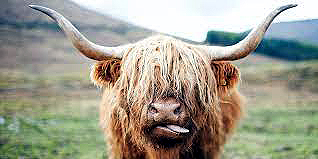
When An Ox Learns To Smile
Like a white ox
I’d like to see him, which,
snorting and lowing, walks before the plough-share:
and his lowing should also laud
all that is earthly!
Dark is still his countenance;
the shadow of his hand dances upon it.
Overshadowed is still the sense of his eye.
~*~
His deed itself still overshadows him:
his doing obscures the doer.
He hasn’t yet overcome his deed.
To be sure, I love in him the shoulders of the ox:
but now
I’d like to see (in him)
the eye of the angel.
~*~
Also his will to be-the-hero
he still has to unlearn:
a celebrated one he is to be,
and not merely an amazing one:
— the universe itself should raise him,
the will-less one!
He has subdued monsters, he has solved enigmas.
But shouldn’t he also
redeem his own monsters and enigmas;
into his heavenly children
he should
transform them.
As yet his knowledge
has not learned to smile,
and to be without jealousy;
as yet his overflowing passion
has not become calm
in beauty.
Truly,
a fantasy of having enough
does not make one satisfied,
cause his longing to subside
and disappear,
but in beauty!
Gracefulness
belongs to the generosity of the open-hearted.
But precisely to the hero
beauty is
the hardest thing of all.
Beauty is unattainable
by all ardent wills.
A little more, a little less:
precisely this much here,
and the maximum here.
Standing with relaxed muscles
and with unharnessed will:
that is so hard for all of you,
you celebrated ones!
When power becomes gracious
and descends into the visible
— I call such condescension,
beauty.*
Thus Spake Zarathustra by Friedrich Nietzsche, trans. by Thomas Common, Part II The Sublime Ones page 115
I am tempted to flatly say this fable speaks for itself. But does anything speak, communicate unaided? This story Nietzsche/Zarathustra features depicting humanity, a wide-angle view of our human situation and of the possibility that remains for us to achieve. Zarathustra admires a strong white Ox pulling a plow, nose to the broken ground, feeling, absorbing, appreciating as only such an animal is able, the richness of the earth. There’s symmetry to this scene: muscular ox, plow-share, the broken earth.
However our ox and humanity is troubled by what it has done, past behaviors haunt the animal, which labors unable to smile. Perhaps you’d agree with me a glimpse of a genuine, unforced smile, is divine-like, – the eyes communicating wordlessly as “the eye of an angel.” What is necessary, what is it going to take so that our ox learns to smile?
Perhaps I’ve said enough so that you can follow Nietzsche/Zarathustra’s progression of thought concerning what is possible for a white ox, so powerful and capable. And for humanity, a troubled species that has demonstrated the ability to compose the sublime and to fabricate abject terror.
There’s work to be done my friend…
*I have exercised a writer’s freedom to substitute contemporary terms for some of the obscure language in the translation